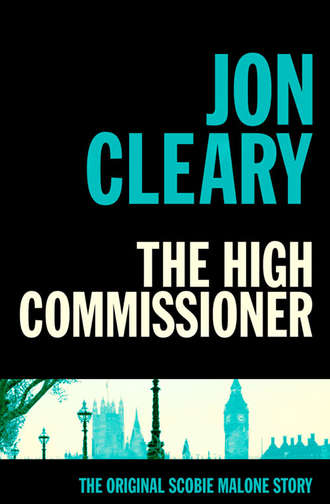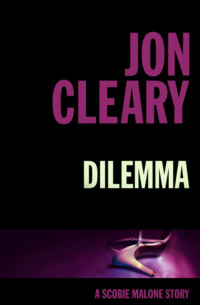
Полная версия
The High Commissioner
“I wonder that Tumbarumba ever let you go,” Lisa had said. He looked quickly in front to see if the Quentins had heard the remark, but if they had neither of them showed any reaction. “I wouldn’t have recognised you as the man I let in a while ago.”
Her smile had taken the ice out of her remark. But she knows I’m an outsider, Malone had thought.
Now here at the reception he felt even more of an outsider. Then through an open arch he saw a waiter go past bearing a tray of food; his stomach reminded him he had not eaten for almost nine hours. He followed the waiter, easing his way through the groups of people with more politeness than he felt. He knew it was stupid to feel resentful because people didn’t turn and welcome him with open arms. But he had been spoiled back in Sydney: there, even the crims had been friendly to him. Except when he came to arrest them.
The supper room was almost deserted but for a few disguised journalists pecking at the perks of the diplomatic social round, and two Negro men in evening dress.
“Enjoying yourself?” The older of the two men, tall and portly and cheerful, had a voice as rich as that of Quentin’s butler; but he had none of the servant’s snobbery, he was a man born to be friendly.
“Not much,” said Malone with undiplomatic truthfulness; hunger always sharpened one’s candour. Then he remembered that he was in an African embassy, that the men beside him were coloured. “Do you belong here?”
“I’m the ambassador. I’m not enjoying it, either.” He laughed, a deep gurgle of merriment that made jelly of his jowls. The younger Negro, lighter skinned and thinner, smiled with more controlled humour. The ambassador was piling a plate with food; he held a bouquet of crab, salad, tomato, celery. “But the food is good. Help yourself. Where are you from?”
“Australia,” said Malone, and saw the younger Negro look at him with sudden interest.
“With Quentin? A splendid chap. I can even forgive him your White Australia policy. He’ll be the one to make a success of this conference.” He added a ribbon of mayonnaise to the bouquet in his hand. “If it’s going to be a success.”
“You don’t think it will be?” Malone followed him round the table, using the ambassador’s plate as his own example: if a diplomat could be a hog, why not a plain policeman?
“Champagne? The wages of sin and diplomacy, Bollinger ’55. Back in my country I’m expected to drink a concoction made out of tropical fruits. We call it Château-neuf-du-Papaya. Terrible stuff.”
“Jungle juice,” said the younger Negro in a soft American accent. “The Aussies used to make it and sell it to our guys in New Guinea.”
“Really? I’m surprised you won the war. Well, now I have to find somewhere quiet to eat this.” The ambassador looked at the heaped plate, then winked a piebald eye at them both. “My father died of gluttony, a surfeit of underdone missionary. What a pity he didn’t live to appreciate the fruits of independence.”
He went rolling out of the room, chuckling to himself. Malone grinned and the younger Negro said, “His father went to Oxford just as he did. Periodically he takes a course in atavism, to come down to the level of some of his politicians back home.”
Malone steered clear of any racial comment: he wasn’t sure that he was not being baited. “Do you work for him?”
“I’m like you, a guest here. The name is Jamaica.”
“You’re an American?”
Jamaica nodded. He might have been a handsome man had his face not been so tight: all his feeling towards the world was screwed in behind the closed defence of his face. The sculptured head, with its close-cropped hair and its stiff dark features, reminded one of a helmet with its visor down: all Jamaica’s pain, joy, hate and love would be his own secret.
“From Georgia.” His voice was softly accented, but he had been gone a long time from Georgia. “I haven’t seen you around before. Are you here just for the conference?”
Malone hesitated, then nodded. “I expect to be going back at the end of the week.”
“You think it’ll be finished by then?”
“Don’t you?” Malone added Russian salad to his plate, hoping it would not indict him in the eyes of the American.
Jamaica shrugged. He wore his evening clothes with less ease than had the African; his jacket was too large and when he shrugged one shoulder slipped forward a little, as if he had dislocated it. He’s like me, Malone thought, he’s wearing someone else’s tail plumes. “You know what conferences are like.”
“I don’t. This is my first.”
Jamaica picked up a stick of celery, bit into it. Across the room the journalists watched attentively, their stares hidden behind their champagne glasses. Their dress suits were less expensive than those worn by the other guests, but they wore them with as much ease; most of them were middle-aged or elderly men who had been on this round for years. Malone, a policeman with little affection for newspapermen, looked at them and thought of them as vultures dressed as penguins. But Jamaica ignored them; all his attention was on Malone. The celery crackled in his mouth as he said, “Your man Quentin is a great one for compromise, isn’t he?”
“You Americans don’t like compromise, do you?”
“It was a European invention.”
“You’re wrong there, mate. I think it was the Chinese.”
“The Chinese aren’t interested in compromise now.”
“That’s the only thing you have in common. You two ought to get together.” Stone the crows, I’m talking like a bloody diplomat; and Malone almost beamed with pleasure at his repartee. This was better than talking cricket scores and football results with the other blokes in the Murder Squad.
“You Australians aren’t in a position to be too independent.”
“No,” said Malone, his plate at last full. “That’s probably why Quentin is plumping for compromise.”
“You’d better be careful.” Jamaica’s voice was even, toneless: you could read into it any emphasis you wished. Malone read a warning, close to a threat; and turned his head sharply to ask Jamaica what he meant. But the American was already walking away. “I’ll see you around.”
Malone stared after him. Why was the American so sour, what did he mean that Malone should be careful? Then Malone was aware of someone moving along the supper table towards him.
Across the room one of the journalists had taken a step forward, but had stopped when he saw the small Oriental woman in the yellow ao dais moving towards the Australian.
“Who’s the woman?” the journalist whispered to one of his colleagues.
“Search me. But East is East and West is West—”
“Yes, I know. And quicker the twain should meet. But somehow I can’t see them going for a concubine down in Chislehurst. And that’s what she’d have to be. I already have a missus.”
“We’re backward here in Britain. We need a New Society.”
At the supper table Malone had turned as the woman spoke to him. “You are an Australian, I believe? Are you here for the conference?”
Out of the corner of his eye Malone saw that Jamaica had halted for a moment beyond the doorway and looked back. Had he warned Malone to be careful of this woman? If so, why? Malone looked down at the woman, tiny, beautiful, as dangerous-looking as a budgerigar.
“Sort of.” He had never become adept at looking at a woman while pretending to look elsewhere; he gazed frankly at this woman with the schoolgirl’s face. There was an innocence about her that seemed incongruous with the sophistication of the tight-fitting gown she wore. The ao dais exposed almost nothing of her but a shimmer of leg, yet it was more revealing than any other gown Malone had seen tonight. But the woman had not cheapened herself: what the gown hinted at was not for sale at bargain prices. “My name’s Malone. Pleased to meet you.”
“Pleased to meet you – I have never heard that greeting before. It is so much friendlier than How do you do. I am Madame Cholon.” Malone put out his free hand. After a moment’s hesitation Madame Cholon smiled and put her hand in his; it felt like the wing of a small bird and he pressed it with rough but gentle fingers. “You seem a very friendly man. One does not meet too many of those at receptions like this.”
“I’m new here. I’ll learn to be like the rest of them. Like something to eat?”
Eyed by the curious journalists, they moved out of the room on to a terrace that overlooked a large garden. Green lanterns bloomed in the trees and guests moved through the aqueous light like floating upright corpses. In the huge houses the chatter of the reception buzzed like the sound of a plague of summer night insects; the effect was heightened by the sultry warmth of the evening. Beyond the garden London was only a dull gold reflection on the low clouds, silent as a faraway eruption.
“This road used to be called Millionaires’ Row.” Madame Cholon pointed to the huge houses behind them, then to the mansions on either side. She picked with long-nailed fingers at a small bunch of grapes. “Then the embassies moved in here. Governments are the only ones with money these days.” Malone noticed the sharp blade of resentment in her soft high voice; this schoolgirl could be spiteful. “But then you are a government man, are you not?”
“None of the money filters down as far as me.”
“I have heard there is very little corruption in Australian government. Where I come from, a man is suspect if he is not corrupt.”
Malone, his mouth full of crab and salad, said nothing. He was ravenous, but he was doing his best not to look as if he were shovelling the food into himself.
“I like to see a man eat.” Madame Cholon bit delicately at a grape as if it were a mango. “Men are always more honest about the sensual pleasures, do you not think so?”
Malone gulped, clearing his mouth. “I hadn’t thought about it. Are they like that where you come from? Where do you come from?”
“Out East,” said Madame Cholon, and Malone remarked the evasiveness. He looked towards the doorway to see if Jamaica was still watching them, but the American had disappeared.
“That covers a lot of territory, Out East.”
“Yes, doesn’t it?” said Madame Cholon, and smiled. She ate another grape, spitting the seeds into her hand with something of the peasant coarseness that occasionally showed in her in the simpler body functions. She had seen this tall, socially awkward man arrive with the Australian High Commissioner and she wondered if he would he returning to Belgrave Square when Quentin returned there. Pallain, Pham Chinh and Truong Tho would want as few witnesses as possible when they killed Quentin.
“Do you gamble, Mr. Malone?”
Malone looked at her in surprise: he was finding it a little difficult to keep up with this woman. All the girls he had known had been straightforward, the sort that a confirmed bachelor preferred: you knew where you stood with them. “Once or twice a year I might have a quid on a horse.”
Betting on racehorses: that was for peasants, like fan-tan and dice. “No, I mean chemin de fer or baccarat.”
“Those games are illegal where I come from.”
This was going to be harder than she had thought. Australia was beginning to sound like a country run by missionaries. “Don’t you ever do anything illegal?”
“Not if I can help it,” he said, and knew he must sound priggish. He waited for her to tell him so, but she was politer than Leeds had been. “Anyhow, what gambler ever finishes up in front?”
“Some of us do,” she said, and her smile was secretive. “You should try your luck some time.”
“Not at baccarat.” He could see the headlines in the Sydney Mirror: Cop Does Dough At Baccarat. That would mean an early retirement, all right.
“I once met an Australian. He said Australians were great gamblers, they had very little respect for your law. He said your national hero was some sort of outlaw. Ed – Kelly?”
“Ned Kelly.” I’ll shoot the next bastard that repeats that lousy joke. He looked at Madame Cholon over a heaped fork and wondered at her interest in gambling. If she was Chinese, that would explain it; but somehow she didn’t look Chinese. “He was what we call a bushranger.”
“And are you not a bushranger?” Malone shook his head, his mouth full. “What are you, Mr. Malone? Are you on Mr. Quentin’s staff?”
Malone turned his face away from the light while he looked at her out of the corners of his eyes. Was every newcomer to a High Commission or an embassy queried as he had been? Or was Quentin so important that anyone connected with him became important? If so, it was a distinction Malone did not want. “Let’s just say I’m attached to him.”
“Too attached to be allowed a night off?” This man was not so stupid after all. If he was a security officer, some sort of bodyguard for Quentin, then she did not want him on hand when the attempt was made to assassinate Quentin. She did not know how forward women were in this country of cold men, but she had to take a risk. She smiled, employing all the subtle charm she had acquired professionally over the last twenty years. “I want to go gambling, Mr. Malone. There is a club in Mayfair, but ladies are not allowed in unescorted. It is very English.”
Malone put down his plate on the stone balustrade of the terrace and picked up his glass of champagne. This was Millionaires’ Row and he was an intruder, a beggar whose bank book would have been laughed at as a worthless visa in this territory.
“Better try someone else, Madame Cholon. I’m not in the Mayfair class. With my salary they’d probably restrict me to the one-armed bandits.”
“What is your salary, Mr. Malone?”
He raised his eyebrows. He had once read that the Asians had very different ideas on privacy from those of the Europeans, but he had never been asked a question as blunt as this before, not even by the Chinese opium smugglers he had met before he had gone on to the Murder Squad. “I get just over two thousand a year, Australian. Sixteen hundred sterling.”
“It is not much, is it?” Diamonds on her fingers winked derisively at him as she raised a hand to the pearls at her throat.
“I was happy enough with it back home.” Which was the truth: he had never dreamed of riches and so had been incorruptible. He had never been smug about his incorruptibility. He knew that every man had his price: he had just never found out what his was.
“But you are not now?”
Malone looked back into the big main room, at the silk walls, the frozen explosion of the huge chandelier, the beautiful women in gowns that would have cost him a month’s salary. “I came here tonight in a Rolls-Royce, the first time I’ve ever been in one, maybe the last. I’m not likely to lose my head over something I’ll only taste once.”
“What sort of car do you have back home?”
“A second-hand Holden.”
“A Holden? What is that?”
“It’s something you don’t drive up to expensive gambling clubs in. Better get someone else, Madame Cholon.” Then he saw Jamaica standing in the doorway watching them, and he nodded. “Ask that bloke. He’s an American. They’re richer than anyone else.”
Madame Cholon looked towards Jamaica. “But he is coloured!”
Malone was not surprised by her reaction. He had heard a Chinese girl in Campbell Street back home in Sydney call an aborigine a dirty black bastard: colour prejudice could run right through the spectrum. All at once he did not like this tiny beautiful woman who seemed so curiously interested in him. He put down his glass on the balustrade and took random aim at her: “You Vietnamese have never bellyached about the colour of American money.”
He knew he had guessed right: she was Vietnamese. She stared at him for a moment, then she said something that was foreign to him but which he well understood: as a policeman he had been sworn at enough to catch the intent if not the words.
“And the same to you,” he said, and walked away from her. He passed Jamaica as he went through the open doors into the main room. The American looked directly at him and he stopped. “Who’s that woman I’ve just left?”
Jamaica looked after Madame Cholon as she went quickly along the terrace and through a doorway into another room. “I was wondering that myself.”
He’s lying, Malone thought. “Let me know if you find out.”
“She’s quite a dish, isn’t she?”
“That’s what she said about you,” said Malone, left him and went on into the room.
Sheila Quentin came towards him. Two hours of diplomatic ping-pong hadn’t touched her; she looked as cool, poised and unmarked as when she had arrived. “We are leaving, Mr. Malone. My husband is feeling very tired. Perhaps you would like to stay on?”
“No, I’m tired, too.”
They began to move across the room. Men flashed quick smiles at Sheila Quentin; the women’s smiles were a little slower. But her own response was warm and quick to everyone; it was a diplomatic smile, but somehow she made it appear sincere.
“Did you bring some bad news for my husband, Mr. Malone?” she said, inclining her head to a huge Nigerian woman, extravagant as an African sunset in her native dress.
“Why?”
“He was quite cheerful when he came home this evening. Confident the conference was going the right way. But now—” She looked up at him. “What sort of message did you bring him from Canberra?”
They were interrupted by two women, a Canadian and a German: Malone stood aside while the three women made arrangements for a committee to clothe the underprivileged of Stepney. Then he and Sheila Quentin moved on. “I think you’d better ask him.”
“It’s as secret as that, is it?”
“I’m afraid so.”
“And bad?” He hesitated, then nodded. She bit her lip and for a moment there was a hint of strain in her face. “Damn! And everything was going so beautifully.”
“I’m sorry,” he said, and was surprised at the depth of sincerity he felt.
“Do you always bring bad news?”
Again he hesitated, then he nodded. “Too often. They think I have the right personality for it.”
“I hate you, Mr. Malone.” She smiled, and he warmed towards her. “But it’s not your fault.”
No, he thought, it’s not my fault. He wondered whom she would hate when she found out whose fault it really was. Then they had reached Quentin and Lisa Pretorious, standing waiting for them just outside the entrance to the main room. Quentin did look tired, a man who had run a long race and had suddenly collapsed at the end of it. The two women looked at him with concern, but he managed to smile.
“It’s nothing. Conferences are like marathon races – you have to wait for your second wind. A spoonful of Horlicks in a glass of Scotch and I’ll be fine.”
The women grimaced and smiled at him; but Malone saw that they were still not reassured. Quentin glanced at him. “Do you ever have need of a second wind, Mr. Malone?”
“The time’s coming up now,” said Malone, and underlined his next words: “I’ll be glad to get home.”
As the Quentins and Lisa went ahead of him out of the big entrance hall Malone looked back. On the other side of the big room Madame Cholon stood by the terrace door watching him, her gaze as cold and steady as that of a marks-man taking aim. Jamaica was moving towards her: his face, too, had the look of a hunter.
II
Pallain sat in the rented black Ford Zephyr. He had learned the advantages of having several passports and driving licences, and the car had been rented in the name of Pierre Martin. He had never liked the risk of using a stolen car on a job; it was always best to stay within the law as much as possible; in a stolen car you always stood the risk of being picked up by a too-observant flic. The Zephyr would be abandoned after they had made their getaway and it could never be traced to Jean-Pierre Pallain. The deposit would be lost, but Madame Cholon was paying for that and fifteen pounds was nothing against the stakes she was playing for.
Pham Chinh, sitting beside him, went to light a cigarette, but Pallain slapped the book of matches from his hand. “Save it,” he said in French. “You can have one later.”
Pham Chinh rubbed a nervous finger down his youthful cheek. He was thirty years old, but he had looked the same age for the past fifteen years: only the eyes had always been old, old and cunning and mean. “It is getting late. Don’t these diplomats ever come home?”
“At least we’re waiting in comfort. Pity poor Tho over there in the gardens.”
He nodded across the square to the dark island of trees and shrubs in its centre. Truong Tho was there, the rifle with the telescopic sight cradled in his arms like a wood-and-metal doll, the guerrilla in the London jungle. Pallain had bought the gun in a shop off Bond Street, where the salesman could not have been anything less than a duke.
“What did you plan to shoot, sir?”
An ambassador: Pallain was sure the man would have approved of the social status of the target. “Deer.”
“With a telescopic sight, sir?”
“Something wrong?”
“Oh, no, sir. But it is hardly–er–sporting, is it?”
Pallain had paid in cash, another thing that had not impressed the salesman; and now Truong Tho was waiting there in the shadows to commit a deed that the English would probably condemn as also not sporting.
“He mustn’t miss.” Pham Chinh was glad he was not the one who had to do the shooting; he knew he would have been too nervous to aim straight. “There won’t be a chance for a second shot.”
Pallain said nothing, but glanced at his watch. The square was deserted but for the occasional passing car or taxi. The tall pale houses gave an impression of being no more than empty shells, despite the lighted windows that showed in one or two of them. The car was parked at the end of Chesham Place where it entered the square; behind them was the German Embassy and across from them was the white portico of the Spanish Embassy. The sound of music came softly from across the road, Segovia in nostalgic mood: someone was homesick for Andalusia. There was the mutter of German voices and two men in white raincoats went by without glancing at the car. London is made up of foreigners, Pallain thought; but there would be one less before the night was out. But then an Australian might not be considered a foreigner; he had never really understood how the Commonwealth worked. Whatever Quentin was, he would be dead tonight, eligible only for the citizenship of the grave.
Then the big black Rolls-Royce, AUS–1, went past, slowing to turn left into Belgrave Square and follow the one-way route round to the Australian High Commissioner’s house on the south side of the square.
Chapter Four
As the big limousine turned left into the square Malone, sitting beside Lisa in one of the jump-seats, glanced casually out at the car parked close to the corner. He saw the two men in the front seat of the car turn their faces away, but not before he had caught a glimpse of the man behind the wheel, a fleeting impression like the subliminal images he had once seen tried out on television. His brows puckered, the policeman in him at work. Why should two men, sitting in a parked car late at night, wish to avoid being seen? Then he shook his head and grinned. Leave it to the London bobbies: it was no concern of his.
“Something amusing you?” Lisa asked.
“Just thinking what my old mum would say if she could see me now. She’s Irish, been in Australia for over fifty years, but she’s still back in the bogs. Her idea of luxury transport is still a trap with two ponies.”
“What did she say when she knew you were coming to London?” Sheila Quentin liked this almost naïvely frank man. Too many of the visitors from Canberra brought frankness with them as some sort of primitive weapon designed to bludgeon the crafty, too-superior swindlers of Whitehall. They bored her and irritated her with their rough approach, an approach she knew they worked on from the moment they left Australia, as if determined to prove they were one with the aborigines, an image they were convinced Whitehall held of them. But this new man seemed to use frankness as part of an unwitting charm.









